
Same-sex couples often resort to surrogacy to have children, renting the womb of a woman, often for payment, and then taking the child from the woman who gave birth to raise as their own.
Some gay couples have also attempted to register themselves on the child’s birth certificate as the official parents, excluding the woman who birthed the child, listing two men or two women in the case of a male sperm donor.
While some countries will issue birth certificates that feature same-sex couples, they are not recognised by countries like Italy, where surrogacy is illegal.
A series of same-sex couples, as well as a heterosexual couple who used surrogacy, took the Italian state to court over the issue, and on Thursday, June 22, the European Court of Human Rights (ECHR) in Strasbourg ruled in favour of the Italian government’s position, the newspaper Il Giornale reports.
In their ruling, the judges determined that couples also had the option to adopt the children but did not do so, and rejected the appeal of the couples.
A similar ruling was made earlier this year when the ECHR decreed that a transgender mother could not be labelled a father on a child’s birth certificate and a sperm donor could not be listed as a mother despite their self-identification.
The plaintiff in the case, a man who identifies as a woman, claimed that their child had been created with “her sperm.”
Members of Prime Minister Giorgia Meloni’s Brothers of Italy (FdI) welcomed the ECHR ruling, with MP Augusta Montaruli stating the ruling, “reaffirms the legitimacy of Italy to refuse the transcription of a filial relationship recognized abroad due to access to a practice prohibited in our nation.”
Montaruli added that using adoption would maintain the rights of the biological parent, the surrogate, in relation to their child.
Mariastella Gelmini, deputy secretary and spokesperson for the liberal Azione party, added, “It is not the result of free choice, the woman’s body cannot be commodified. Those who are unable to have children must initiate adoption procedures, whose implementation time must be speeded up. We must defend women and their lives.”
While surrogacy is illegal in Italy, the Italian government under Prime Minister Meloni has proposed to prosecute those who go overseas for a surrogate pregnancy, even if the practice is legal in the country where it takes place.
According to a report from the Associated Press, those found guilty of engaging in surrogacy abroad could face three years in prison and a fine of up to a million euros
“We strenuously say no to the sale of children. Surrogate maternity is the most extreme form of commercialization of the body,″ MP Maurizio Lupi said earlier this week.
One of the most popular destinations for overseas surrogacy in Europe is Ukraine. At least 500 Italian couples have sought surrogacy in the war-torn country since 2021.
Despite the ongoing war between Ukraine and Russia, the surrogacy industry in Ukraine has not stopped and business appears to be booming, with would-be parents paying as much as €65,000 to agencies that manage the entire process, including travel and birth documents.
Surrogacy has also been condemned by the Roman Catholic Church. The Catholic Italian Bishops’ Conference (CEI) stated in March that the practice was “unacceptable.”
“As the Pope said, there is a risk of the commodification of women, especially the poorest women, and of transforming the child into an object of a contract,” said Archbishop of Cagliari Giuseppe Baturi, who serves as secretary general of the CEI.
